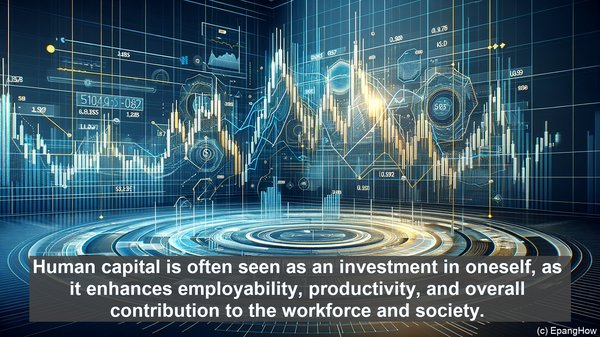Introduction: The Dual Dimensions of Capital
Greetings, audience! Capital is a term often associated with finance, but did you know it has a broader connotation? In this video, we’ll be focusing on two distinct types of capital – financial capital and human capital. While both are valuable, they differ significantly in their nature and implications. Let’s dive in!

Defining Financial Capital: Beyond Monetary Assets
Financial capital primarily refers to monetary resources, assets, and investments. It encompasses tangible entities like cash, property, and stocks, as well as intangible elements like bonds and intellectual property. Essentially, financial capital represents the wealth and financial power an individual or entity possesses. It’s often seen as a means to generate more wealth through investments, loans, or business ventures.
Unpacking Human Capital: The Power of Knowledge and Skills
On the other hand, human capital is centered around individuals and their abilities. It encompasses the knowledge, skills, experience, and potential of a person. Unlike financial capital, human capital is intangible and resides within individuals. It’s not just about formal education; it also includes on-the-job training, personal development, and even innate talents. Human capital is often seen as an investment in oneself, as it enhances employability, productivity, and overall contribution to the workforce and society.
The Dynamics of Accumulation and Growth
One of the key distinctions between financial and human capital lies in their dynamics of accumulation. Financial capital can be acquired through various means, such as savings, investments, or inheritances. It can also grow through interest, dividends, or capital gains. Human capital, on the other hand, is built over time through learning, skill development, and experience. It’s a continuous process that requires effort and investment in education, training programs, and professional development.

The Significance in Economic Contexts
Both financial and human capital play crucial roles in economic systems. Financial capital fuels economic activities by providing the necessary resources for businesses to start, expand, or innovate. It’s often seen as a driving force behind economic growth. Human capital, on the other hand, is the engine that powers productivity and innovation. A skilled and knowledgeable workforce is essential for industries to thrive, adapt to changing demands, and drive technological advancements.
The Interplay and Synergy
While financial and human capital are distinct, they are not mutually exclusive. In fact, they often interact and influence each other. For instance, financial capital can be used to invest in human capital, such as funding education or training programs. On the other hand, human capital can enhance an individual’s ability to generate financial capital, be it through higher-paying jobs or entrepreneurial endeavors. The synergy between the two is crucial for sustainable economic development.
